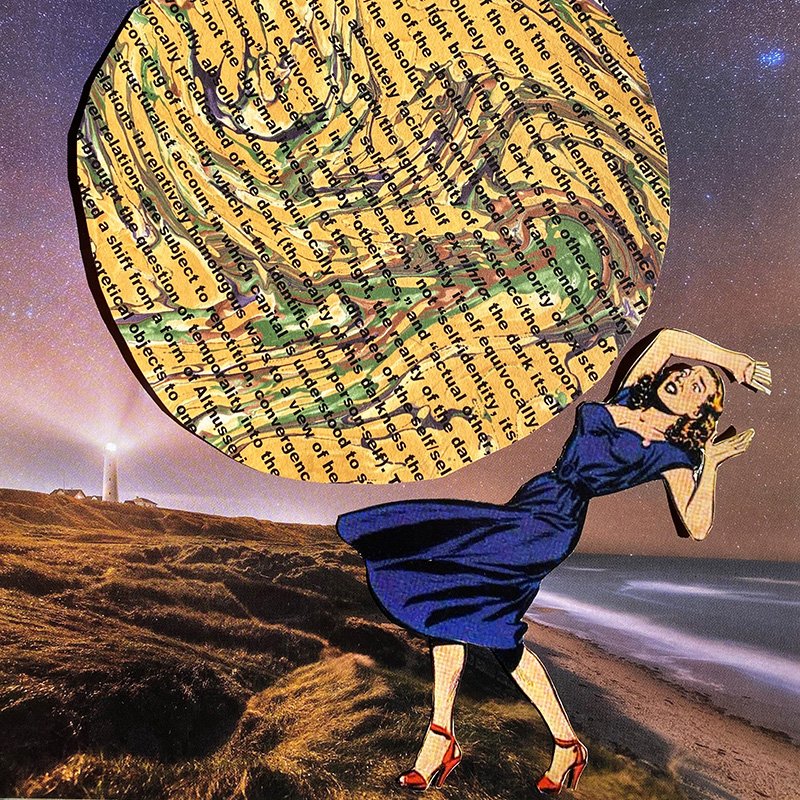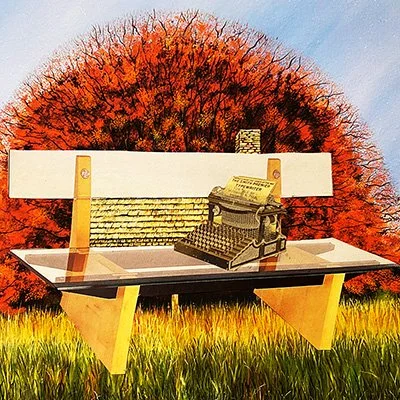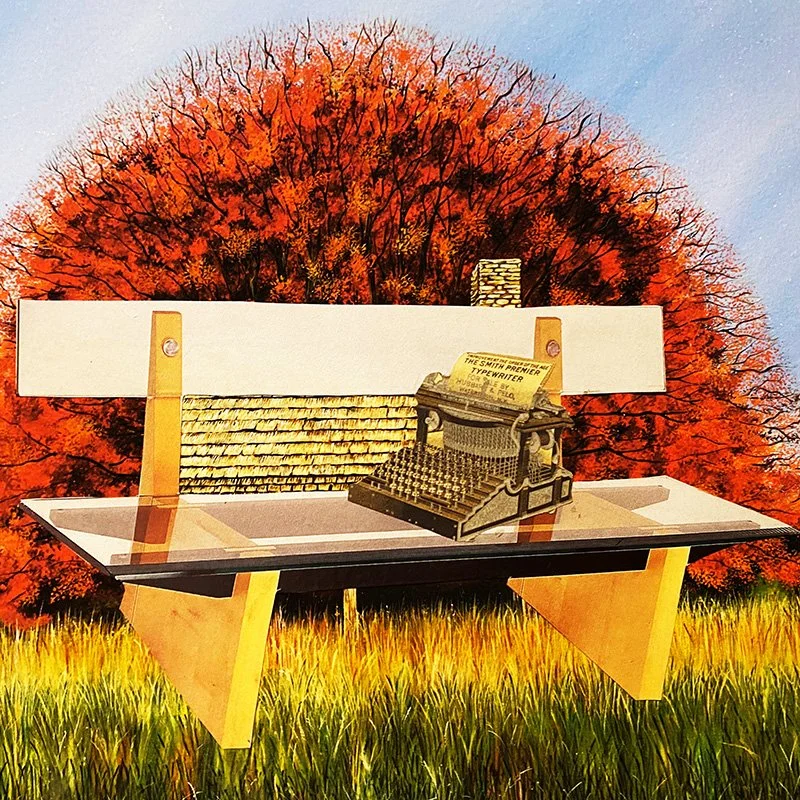I couldn't resist using a pair of pinking shears to create this paper collage, in homage to my recent WriteSPACE Special Event guest Steven Pinker, the Johnstone Family Professor in Psychology at Harvard University.
The English verb pink, which dates back to the 14th century, means "pierce, stab, make holes in." But the purpose of pinking shears is not destructive -- quite the opposite. The zigzag pattern of the blades prevents woven cloth from fraying and produces a decorative edge reminiscent of the common garden flowers called pinks.
Steven Pinker's prose style, likewise, is incisive yet elegant, hole-punching yet healing, piercing yet humane. Whether you know him as a distinguished psycholinguist, a fearless social commentator, a consummate prose stylist, or all of the above, I hope you'll be as pleased as I was that he gave up an hour and a half of his precious sabbatical leave to visit us in the WriteSPACE on May 4.
In the first 90 minutes of this live 2-hour Special Event, I engaged Steve in a wide-ranging conversation about his background and evolution as a writer, his personal and professional sense of style, and -- with a nod toward his most recent book, Rationality -- the role of rationality in academic and professional writing. The final half hour featured a hands-on “reverse engineering” workshop inspired by his 2015 book, The Sense of Style: The Thinking Person's Guide to Writing in the 21st Century.
Here are some comments made by last week's Virtual Writing Studio participants about the Pinking Shears collage, before I revealed that it had anything to do with Steven Pinker:
Marie (Texas, USA):
Crafting, assembling, designing… Piece by piece, square by square, a mission is underway and a new world unfolds. We will wake up to a newly fashioned environment; not a moment too soon.Nina (Brisbane, Australia):
A wedding planner swimming! Karen Barad's agential realism uses the concept of "cut-together-apart."Lorna (Scotland, UK):
I like the jigsaw-like qualities of the pinked edges.Lynne (Brighton, UK):
The serration creates more edge surface on the blade, which concentrates its cutting power. Compacted, it does more.Anita (Cape Town, South Africa):
Snipping work into bite sized chunks is a strategy to move work forward.Vicky (Essex, UK):
It reminds me of how I edited my PhD -- I would restructure by printing out, cutting up, and sticking together.Hussain (Indonesia):
Lies against purple background with its mouth wide open from exhaustion.Eva (Germany):
Rethinking a journal article: the open scissors point different directions the article could go; the black frame for requiring a clear framework; and the paper fragments and flowers for playing around creatively with ideas.Ramón (Melbourne, Australia):
It’s a puzzle, any piece can be matched with any other. Since they are all the same form, there is not just one solution.
And here is WriteSPACE member Nina Ginsberg’s lively account of the live event:
…………….
I found the discussion between Helen Sword and Steven Pinker insightful and inspiring. A few standout ideas for me were Steven’s observations that most writers don't consult style manuals, they consume good prose and devote attention to why it is good, clear and affecting writing – and by default these people assimilate an inventory of good writing. Another gem was Pinker’s comment that at university, it is not the undergraduates that are the ‘bad writers’, but the (post)grads, because they are often drawing on jargon from a small clique of scholars and need to ‘prove their work’ so it is often very hedged and qualified (that's me!). As a teacher, I was impressed with Pinker’s generosity in sharing his Rationality class materials. This made me reflect on alternative ways scholars, teachers and writers can share their work beyond mainstream publication.
A few other takeaways I garnered were: that Pinker avoids using parenthetical; he is conscious that every new equation included in a book ‘cuts the readership in half’; he harnesses the power of well-placed jokes, humour and concrete, relatable, witty examples to highlight specific concepts...and as always...he knows the importance of having a good ending to paragraphs. At one stage, Pinker mused about the many spatial and temporal contours of prepositions (you fill in a form, but also fill a form out) and that ‘up’ has a completion and vertical ‘sense’ about it...what Pinker called a ‘spectral sense’. I enjoy listening in to other writers ‘think out loud’ like this my favorite example of this is a private recording of Dr Oliver Sacks trying to find the right words as he writes.*
*In my draft of this piece, I had this phrase originally in parenthesis, but took it out as a homage to Pinker, but then realized I needed parenthesis if I were to include this annotation in-text, so I popped it here. (Oh, the irony!) ...and there they are again. - argghh! I tried Steven! Your ideas on writing continue to challenge me! NG.
Later on, the conversation turned to Pinker's writing process. He outlined his 6-stage drafting process which included a brain dump, a ‘frankenchapter’ (a term I love and will be using with relish!), sending it his mum to read as she is his trusted go to non-academic reader-feedbacker, then after a few more drafts, he does one last, slow edit for reasoning at the end to improve the prose. To wrap up, Steven shared a few sample texts and explained the deliberate techniques he embedded in the writing and organization. This metathinking about how writers use words, logic and literary devices is what keeps me coming back to WriteSPACE events like this!
A big thanks to Helen and Steven for sharing their time, expertise and ideas so generously. If you did not attend or have not yet watched the recording, make a cup of tea, get comfortable and enjoy this wonderful discussion about writing and rationality.
…………….
And a big thanks to you, Nina, for sharing your comments! A video of my conversation with Steven Pinker is now available for members in the WriteSPACE Library.
Not a member yet? Register here to receive an email with the video link.
Better yet, join the WriteSPACE with a free 30 day trial, and access our full Library of videos and other writing resources.
Subscribe here to Helen’s Word on Substack to access the full Substack archive and receive weekly subscriber-only newsletters (USD $5/month or $50/year).
WriteSPACE members enjoy a complimentary subscription to Helen’s Word as part of their membership plan (USD $15/month or $150/year).








